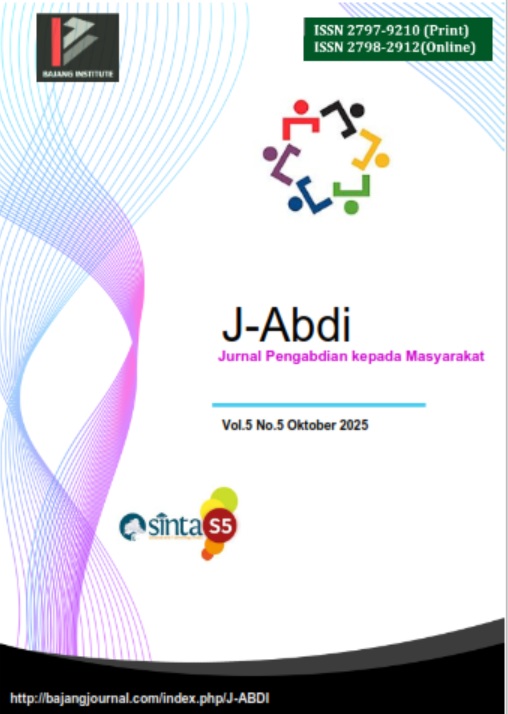KOLABORASI PERGURUAN TINGGI DAN MASYARAKAT UNTUK PENGEMBANGAN DESA TIMORO BERKELANJUTAN MELALUI KKN MAHASISWA UNIVERSITAS MUHAMMADIYAH MAMUJU
DOI:
https://doi.org/10.53625/jabdi.v5i5.11399Keywords:
Community Empowerment, Health Education, Environmental Management, Local Product Innovation, Sustainable VillageAbstract
The Community Service Program (Kuliah Kerja Nyata/KKN) represented a tangible implementation of the Tri Dharma of Higher Education, particularly in the area of community engagement. This article discussed an integrated community empowerment initiative in Timoro Village, Tabulahan Sub-district, Mamasa Regency, West Sulawesi, which was carried out by students of Universitas Muhammadiyah Mamuju. The program was designed to address local issues such as low awareness of Clean and Healthy Living Behavior (PHBS), suboptimal waste management, and the underdeveloped potential of local economic products. The method employed was a participatory approach, involving students, village authorities, and community members in every stage of the activities, ranging from problem identification, planning, and implementation to evaluation. The results indicated an increase in community awareness of the importance of PHBS and stunting prevention, the establishment of routine practices for maintaining environmental cleanliness, as well as the creation of innovative local products such as pineapple jam and dodol, which had the potential to enhance economic self-reliance. In addition to delivering tangible benefits for the community, the program also strengthened students’ competencies in leadership, communication, and teamwork. The study concluded that the integration of health education, environmental management, and local product innovation could serve as a sustainable and replicable model of community service in rural areas of Indonesia.
References
Chambers, R. (1997). Whose reality counts? Putting the first last. Intermediate Technology Publications.
Ife, J. (2013). Community development in an uncertain world: Vision, analysis and practice. Cambridge University Press.
Nurdin, A. (2021). Edukasi perilaku hidup bersih dan sehat pada masyarakat pedesaan: Strategi pencegahan stunting berbasis keluarga. Jurnal Pengabdian Kepada Masyarakat, 5(2), 145–154. https://doi.org/10.22219/jpkm.v5i2.1456
Suharto, E. (2020). Perguruan tinggi dan pemberdayaan masyarakat: Membangun kolaborasi untuk desa berkelanjutan. Jurnal Pemberdayaan Masyarakat Madani (JPMM), 4(1), 1–15. https://doi.org/10.21009/JPMM.04101
Wijayanti, R., & Prasetyo, H. (2022). Inovasi produk lokal berbasis sumber daya desa sebagai penggerak ekonomi masyarakat. Jurnal Ekonomi dan Pembangunan Indonesia, 23(1), 55–68. https://doi.org/10.20473/jepi.v23i1.32881
World Health Organization. (2020). Stunting policy brief. WHO. https://www.who.int/news/item/15-01-2020-stunting-policy-brief
Yuliana, L., & Hamid, A. (2021). Integrasi edukasi kesehatan dan pemberdayaan masyarakat dalam program pengabdian berbasis KKN. Jurnal Pengabdian dan Pemberdayaan Masyarakat, 5(3), 231–240. https://doi.org/10.21831/jppm.v5i3.35421
Zulfa, M., Raharjo, S. T., & Wibhawa, B. (2019). Pemberdayaan masyarakat desa melalui pendekatan partisipatif: Studi kasus di Indonesia Timur. Journal of Community Development, 4(2), 87–98. https://doi.org/10.15294/jcd.v4i2.29841
Rahmawati, D., & Santoso, I. (2023). Penguatan kapasitas masyarakat dalam pengelolaan sampah berbasis partisipasi. Jurnal Ilmu Lingkungan, 21(1), 45–56. https://doi.org/10.14710/jil.21.1.45-56















